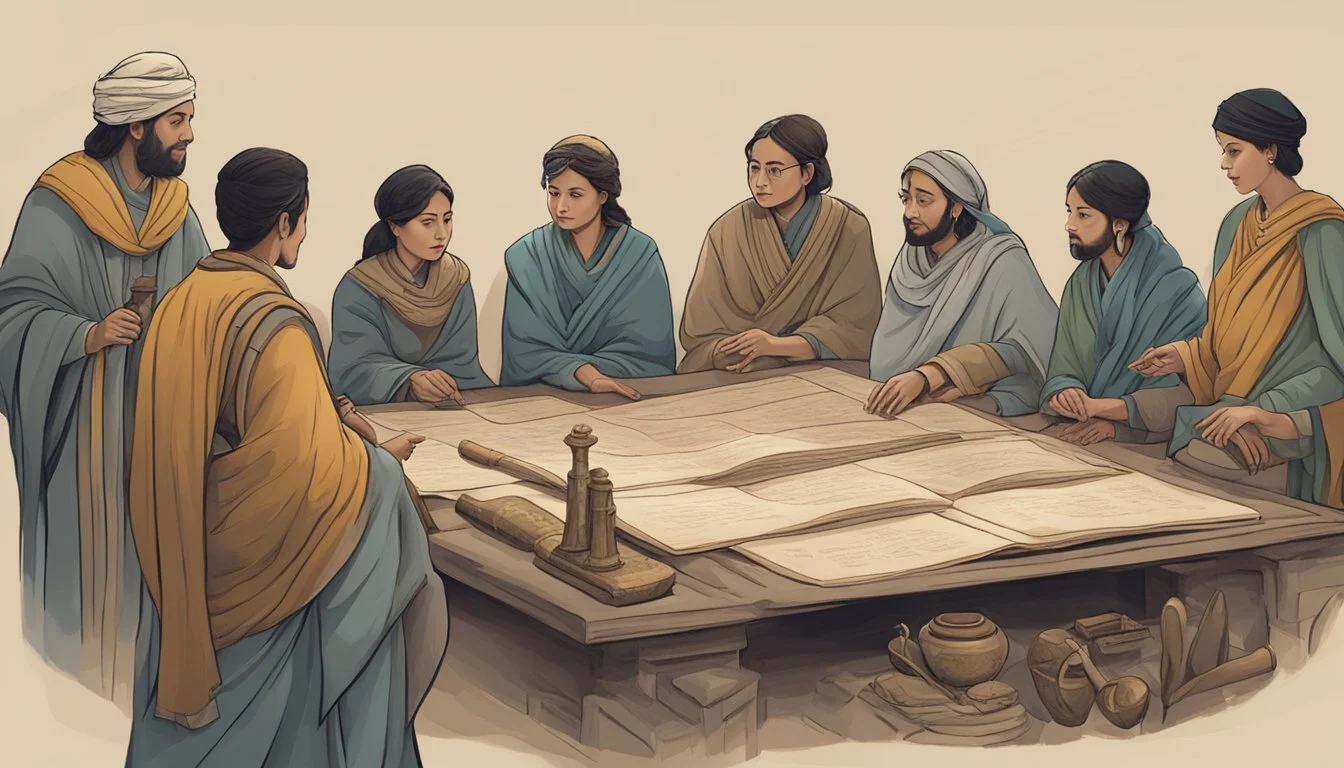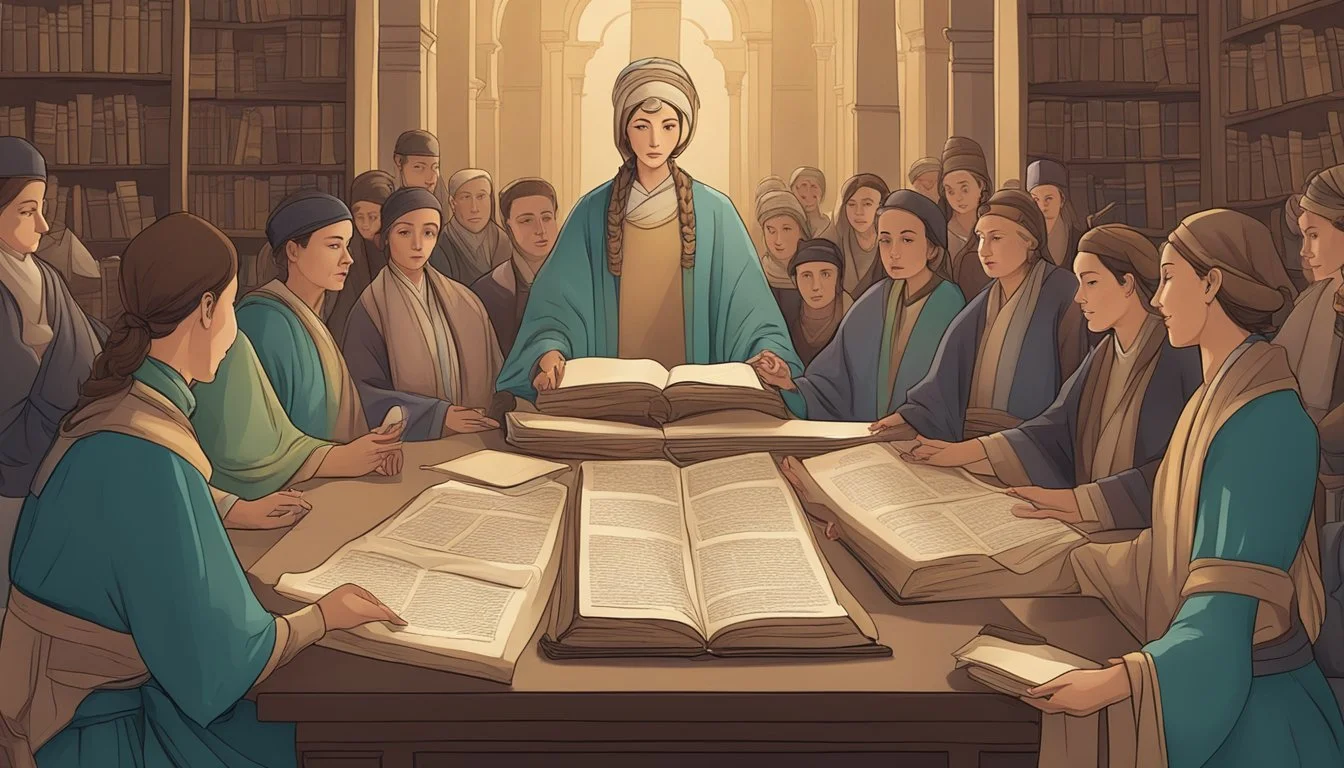The Role of Women in 'Testament': Expanding on Biblical Narratives
Unveiling Hidden Voices
The role of women in the New Testament offers a rich tapestry of narratives that challenge traditional interpretations. Women feature prominently in key biblical stories, serving as disciples, patrons, and early church leaders. Their contributions often go beyond societal norms of the time, providing insight into the evolving status of women in early Christianity.
The New Testament presents women as venerated partners and cherished companions, elevating their status beyond mere household fixtures. This portrayal contrasts with common perceptions of women's roles in the ancient world. From Mary, the mother of Jesus, to female disciples and church patrons, the biblical text showcases women actively participating in the ministry and spread of the gospel.
Critical examination of these narratives reveals a complex interplay between cultural norms and progressive ideals. The stories of women in the New Testament continue to inspire scholarly debate and shape contemporary understandings of gender roles within religious contexts. By expanding on these biblical narratives, we gain valuable insights into the diverse and significant contributions of women in early Christian communities.
Biblical Heritage of Women
The Bible presents a rich tapestry of female characters who shaped the course of history. These women embodied diverse roles, from matriarchs and prophetesses to disciples and leaders.
Genesis and Early Narratives
Genesis introduces pivotal female figures. Eve, the first woman, partners with Adam in tending Eden. Sarah, wife of Abraham, becomes the matriarch of the Israelite nation. Rebekah plays a crucial role in determining the line of succession.
Miriam, sister of Moses, emerges as a prophetess and leader during the Exodus. Deborah serves as both judge and prophetess, leading Israel to military victory.
These early narratives establish women as key players in God's plan, showcasing their faith, wisdom, and courage.
Archetypes and Female Exemplars
The Old Testament presents various female archetypes. Ruth exemplifies loyalty and faith. Esther demonstrates courage and political savvy in saving her people.
The Proverbs 31 woman embodies industry, wisdom, and strength. This idealized portrait serves as a model of capable womanhood.
Motherhood features prominently, with figures like Hannah and Elizabeth showcasing faith and devotion. Jochebed, mother of Moses, displays ingenuity in protecting her son.
These archetypes provide diverse models of female identity and virtue.
Women in the New Testament
The New Testament expands women's roles within religious life. Mary, mother of Jesus, stands as a central figure in Christian tradition.
Women like Mary Magdalene, Joanna, and Susanna support Jesus' ministry. The Samaritan woman at the well becomes an evangelist to her community.
Priscilla emerges as a teacher and church leader alongside her husband Aquila. Phoebe serves as a deacon, while Junia is noted as prominent among the apostles.
These New Testament accounts highlight women's active participation in the early church, challenging cultural norms of the time.
Socio-Cultural Context
Women's roles in Testament were shaped by complex social and cultural forces. The Greco-Roman world, household structures, and material practices all influenced how women engaged with early Christian communities.
The Greco-Roman World
Roman society was patriarchal, with men holding most positions of power. Women had limited legal rights and were generally expected to focus on domestic duties. However, some upper-class women wielded significant social influence through patronage networks.
In Greek culture, women's public roles were even more restricted. They rarely participated in politics or commerce. Education for women was uncommon, though some wealthy families did educate their daughters.
Religious practices offered women more opportunities for public engagement. Many cults had priestesses, and women participated actively in rituals and festivals.
Households and Christian Communities
Early Christian gatherings often took place in private homes. This household setting allowed women to play important roles as hosts and leaders.
Some women, like Lydia and Priscilla, are mentioned as church patrons or teachers in the New Testament. They provided meeting spaces and resources for fledgling congregations.
Christian teachings on equality challenged traditional gender roles to some degree. Paul's letters suggest women served as deacons and possibly even apostles in early churches.
Material Culture and Devotional Practices
Archaeological evidence reveals women's participation in early Christian rituals. Funerary art depicts women in prayer poses and performing baptisms.
Inscriptions and texts mention women donating funds for church buildings and commissioning religious artwork. This indicates their active involvement in shaping Christian material culture.
Personal devotional items like amulets and prayer beads have been found in women's burials. These artifacts suggest women engaged in private spiritual practices alongside public worship.
Roles and Agency
Women in early Christian communities held diverse roles that challenged traditional gender norms. They exercised agency and moral authority in ways that expanded their influence beyond conventional expectations.
Leadership Roles in the Early Church
Women occupied significant leadership positions in early Christian congregations. Priscilla, alongside her husband Aquila, taught the faith and hosted a house church. Phoebe served as a deacon in the church at Cenchreae. Lydia, a successful businesswoman, became a key patron and leader after her conversion.
These women defied societal constraints by taking on roles typically reserved for men. Their contributions were vital to the spread and organization of early Christian communities.
Women as Apostles, Prophets, and Teachers
The New Testament recognizes women in roles of spiritual authority. Junia is described as "prominent among the apostles" in Romans 16:7. The daughters of Philip were known prophets in the early church.
Priscilla taught the educated Apollos, demonstrating her theological acumen. Mary Magdalene, called the "apostle to the apostles," was the first to witness and proclaim Christ's resurrection.
These examples highlight women's active participation in spreading the gospel and shaping early Christian theology.
Agency and Moral Authority
Women in early Christian texts often displayed remarkable moral agency. Mary's acceptance of her role in the incarnation demonstrated her spiritual discernment and willingness to embrace a divine calling.
The Samaritan woman at the well exercised agency by engaging Jesus in theological discourse and subsequently evangelizing her community. Tabitha (Dorcas) used her resources to care for widows, embodying Christian charity.
These accounts portray women as autonomous moral agents, capable of making significant spiritual and ethical decisions that influenced their communities.
Theological Perspectives
Examining biblical narratives through various theological lenses reveals new insights into the role of women in scripture. These approaches challenge traditional interpretations and offer fresh perspectives on gender dynamics in religious texts.
Scriptural Exegesis and Hermeneutics
Scriptural exegesis involves careful analysis of biblical texts to uncover their original meaning. Hermeneutics focuses on interpreting these texts in contemporary contexts. Both methods have been applied to reassess women's roles in the Bible.
Scholars employ historical-grammatical analysis to understand the cultural context of biblical passages. This approach reveals nuances in language and societal norms that impact interpretations of women's roles.
Feminist hermeneutics emphasizes reading scripture through a gender-conscious lens. This method highlights previously overlooked female characters and reinterprets familiar stories from women's perspectives.
Feminist Biblical Interpretation
Feminist biblical scholars challenge traditional patriarchal readings of scripture. They seek to recover women's voices and experiences within biblical narratives.
This approach examines texts for evidence of women's leadership and agency. It also critiques passages that have been used to justify gender hierarchy.
Feminist interpretations often focus on:
Women prophets and leaders in the Bible
Jesus' interactions with women
Female disciples in early Christianity
These readings aim to promote gender equality within religious communities.
Liberation Theology and Empowerment
Liberation theology emphasizes the liberation of the oppressed as a central theme in scripture. This perspective views women as a marginalized group within biblical contexts.
Proponents argue that God sides with the oppressed, including women. They interpret Jesus' ministry as a model for empowering the disenfranchised.
Key concepts in this approach include:
God's preferential option for the poor and marginalized
The role of women in Jesus' ministry and early church leadership
Reinterpreting biblical texts to support gender equality
Liberation theologians seek to empower women through these interpretations, challenging traditional power structures in religious institutions.
Ethical and Social Dimensions
The role of women in 'Testament' explores complex ethical and social issues. It highlights challenges faced, victories achieved, and evolving gender relations within spiritual contexts.
Challenges and Victories
Women in 'Testament' confront numerous obstacles. They navigate patriarchal societal structures and religious traditions that often limit their roles. Despite these constraints, many women demonstrate remarkable resilience and agency.
Key victories include women gaining recognition as spiritual leaders and teachers. Figures like Mary Magdalene emerge as influential disciples, challenging traditional gender hierarchies. Women also play crucial roles in spreading early Christian teachings.
Some women in 'Testament' narratives defy societal expectations. They engage in theological discussions, support religious movements financially, and make important decisions that shape community dynamics.
Justice, Social Justice, and Gender Relations
'Testament' narratives reveal complex gender relations and issues of social justice. The treatment of women varies across different texts and historical contexts.
Some passages advocate for equal treatment of women in religious practices. Others reflect more restrictive views on women's roles. This tension highlights ongoing debates about gender equality within religious traditions.
Social justice themes emerge in stories of women advocating for the vulnerable. Figures like Tabitha exemplify compassionate service to widows and the poor. Such accounts emphasize the importance of addressing societal inequities.
Empowerment and Spiritual Leadership
'Testament' portrays women in diverse spiritual leadership roles. They serve as prophets, teachers, and early church leaders. This challenges traditional notions of male-dominated religious hierarchies.
Women like Priscilla emerge as respected theological instructors. They contribute significantly to the development and spread of early Christian teachings. Such examples provide models of female empowerment within religious contexts.
The spiritual authority of women in 'Testament' often stems from their faith and actions rather than formal positions. This highlights alternative paths to leadership and influence within religious communities.
Narratives and Influence
Women's narratives in 'Testament' expand on biblical accounts, exploring religious experiences and reception history. These stories offer new perspectives on familiar scriptural events.
Annunciation and Religious Experience
The Annunciation, where Angel Gabriel informs Mary of her divine pregnancy, is reimagined in 'Testament'. This pivotal moment is portrayed as a profound religious experience, delving into Mary's thoughts and emotions.
The narrative explores Mary's initial confusion and eventual acceptance of her role. It presents her as a complex individual grappling with the weight of divine intervention in her life.
'Testament' also examines other women's spiritual encounters, broadening the scope of religious experiences beyond traditional biblical accounts.
Scriptural Accounts and Reception History
'Testament' reinterprets scriptural accounts of women, offering fresh insights into their lives and motivations. These narratives challenge traditional interpretations and highlight often overlooked aspects of women's roles in biblical stories.
The work explores how these reimagined accounts might influence reception history. It considers how new perspectives on biblical women could shape modern understanding of scripture.
'Testament' examines the potential impact of these narratives on religious discourse and feminist theology. It raises questions about the representation of women in religious texts and traditions.
Textual Analysis and Interpretation
Feminist interpretations of biblical texts employ close reading techniques and historical analysis to uncover new perspectives on women's roles. These approaches challenge traditional narratives and shed light on often-overlooked female figures.
Close Reading of Key Passages
Close reading of biblical passages reveals nuanced portrayals of women. The story of Jephthah's daughter in Judges 11 exemplifies this approach. A feminist lens highlights the daughter's agency in accepting her father's vow, rather than viewing her as a passive victim.
This reading emphasizes her bravery and sacrifice. It also critiques the patriarchal system that allowed such vows. Similar close readings of New Testament texts uncover women's leadership roles in early Christian communities.
Historical Narrative and Feminist Anabaptist Reading
Feminist Anabaptist readings contextualize biblical narratives within their historical settings. This approach considers the social and cultural norms of ancient societies. It examines how these norms influenced the portrayal of women in scripture.
For example, analysis of New Testament texts reveals women's participation in house churches. This challenges traditional interpretations that limit women's roles. Historical criticism also highlights the contributions of women like Priscilla in early Christian ministry.
Feminist Anabaptist readings emphasize peace, justice, and community. They interpret biblical texts through this lens, often revealing empowering narratives for women.
Contemporary Relevance and Reflections
The role of women in Christianity continues to evolve, shaped by both traditional interpretations and modern perspectives. Debates persist around gender equality, leadership opportunities, and the application of biblical teachings to contemporary contexts.
Modern Gender Relations in Christianity
Many Christian denominations have made strides toward gender equality. Women now serve as pastors, priests, and bishops in several traditions. The ordination of women has become increasingly common, though not universally accepted. Some churches emphasize gender complementarity, while others promote egalitarian views.
Biblical scholarship has shed new light on women's roles in early Christianity. Reexamination of texts like Romans 16 reveals women as leaders and teachers in the early church. This has prompted discussions about women's leadership in modern congregations.
Debates continue regarding the interpretation of passages on female modesty and male headship. Some argue for cultural contextualization, while others maintain traditional views.
Women's Struggles and Resilience in the Church
Women in Christianity face ongoing challenges. Glass ceilings persist in many denominations, limiting access to top leadership positions. Some women report feeling marginalized or undervalued in their faith communities.
Despite obstacles, women have shown remarkable resilience. They have founded ministries, led missionary efforts, and made significant theological contributions. Women's groups and networks provide support and advocacy within churches.
Efforts to address gender-based discrimination and abuse within religious institutions have gained momentum. Many churches now implement policies to protect and empower women.
Women's voices in biblical interpretation and theology continue to grow stronger. Feminist theologians offer fresh perspectives on scripture and challenge traditional gender norms.






